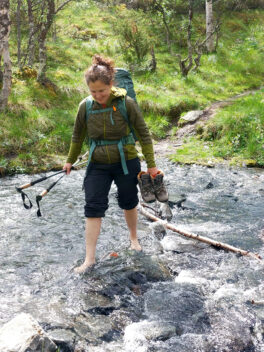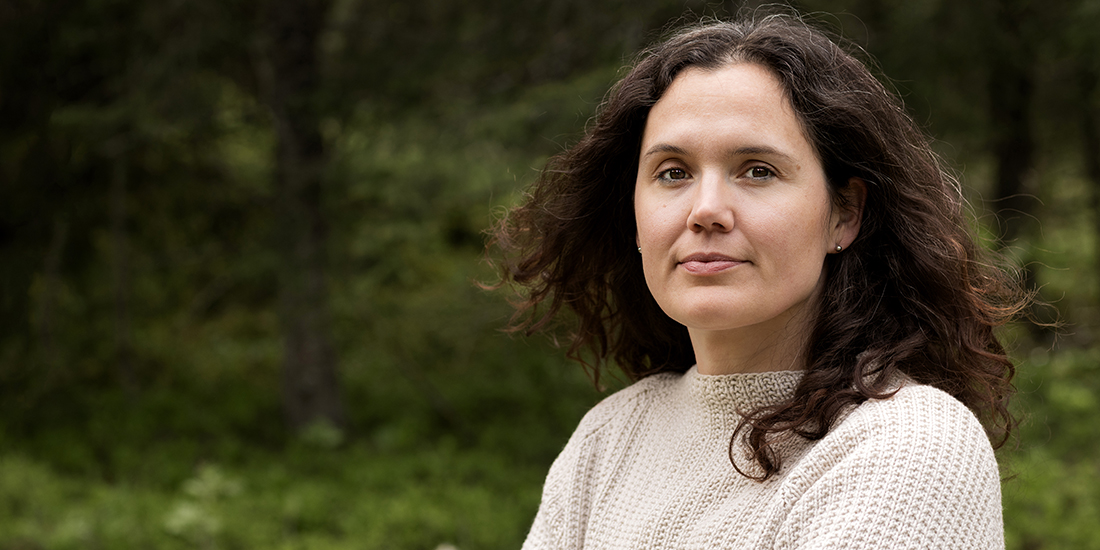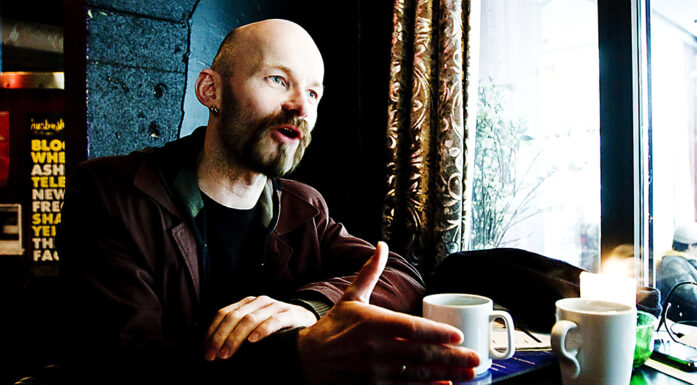Worried that large language models are getting out of hand
“It’s not the politicians, but Big Tech that now gets to decide how technology should be used,” says Heidrun Åm.
When new technologies enter society, she asks critical questions, like: What do we want to achieve with this technology? How should it be used and governed? She emphasizes that both researchers and the public at large need to make active choices about what kind of society we want to create.
Professor Heidrun Åm (43) is a distinguished researcher who leads major projects and has received prestigious awards and recognition, including being named one of NTNU’s Outstanding Academic Fellows. She was also part of a government-appointed expert group that has investigated how artificial intelligence can influence elections.
One of the things I have tried to show in recent years is precisely what technology means in relation to power and democracy.
Åm studies how technology influences society and analyses the power held by the major technology companies. In addition, she studies the political governance of new technologies – such as nanotechnology, biotechnology, social media and artificial intelligence.
Heidrun Åm speaks quickly and energetically, with a fairly soft but very clear voice, tinged with an Austrian accent. When she shares from her research experience, she has a vast portfolio to draw on.
- You might also like: The danger of AI is that it’s so good, you can’t resist
A place to flourish
She says it is a paradox that she ended up working with technology, because she actually finds technology itself quite boring. But analysing technological development from a social science perspective is something that engages her immensely. She has been a vocal advocate for incorporating technology perspectives into sociology and political science, which are her main fields of expertise.
“So it was great to end up at NTNU, since it is a technical university that also has a large social science department. This is a place where people like me can flourish!”
When ChatGPT was launched in 2022, she noticed that her students suddenly developed a much greater interest in the effect new technologies have on society.
“One of the things I have tried to show in recent years is precisely what technology means in relation to power and democracy. It was almost like reality caught up with my research,” she said.
- You might also like: Can exams be fair with the broad availablilty of ChatGPT?
Austrian legacy
Åm’s interest was first sparked during her youth in Austria.
“Being critical of major technologies may have something to do with the Austrian identity. A couple of examples: In the 1970s, Austria built a large nuclear power plant – Zwentendorf – but it was never used, because the protests against it were so strong. There was also strong opposition to genetically modified food in the 1990s,” she said.
Austria’s technology policy and culture are characterized by a healthy dose of scepticism, she said.
“I am sure this has played a role in developing my social science interest in technology – and the critical perspective that has always driven me,” she added.
- You might also like: Podcasts and compulsory attendance improved student learning
Vanity
“My original plan was to become a journalist. I didn’t really see myself even going to university. Both of my parents dropped out of school when they were 15, so I guess it is not very common to become an academic in that situation.”
With a view to becoming a journalist, she studied political science at the University of Vienna.
“I came from a small town and experienced that some of the other students, from private schools in Vienna, were much more articulate than I felt in study group discussions,” she said.
But she stood out academically, and a professor recognized her talent.
“This was a professor at the university who we all greatly admired, and he phoned me to ask if I wanted to apply for a PhD scholarship. I thought it was a great honour to get a call from a professor, so I think vanity played a bit of a role in making me continue in academia,” she said.
Nanotechnology
Alongside her studies, she worked as a journalist for the university newspaper. A physics researcher she interviewed suggested she take a closer look at nanotechnology saying ‘it’s the new nuclear energy’.
Making things better is always relevant, but it feels especially important now because there is so much happening that really matters. And it’s happening so quickly, both in technology and politics

Heidrun Åm has grown fond of hiking on the pilgrim paths. She has walked from Lillehammer to Oppdal with her father, and the next trip is planned from Kongsvoll to Trondheim. It is not the religious aspect that appeals to her, but simply being able to walk in the great outdoors.
“That is when my interest in the revolutionary nanotechnology was sparked,” she said. But nanotechnology would lead to even more.
It was love that brought her to Norway and Trondheim. It happened on a train in Germany on the way to a summer school in Alsfeld. Trond Åm was on the same train, on the way to the same summer school. He was studying the topic of trust and nanotechnology at NTNU, and she was studying the governance of nanotechnology at the University of Vienna. The two quickly struck up a conversation.
“I immediately noticed that Heidrun radiated a unique determination and integrity that I hadn’t encountered before, and which I believe I have yet to meet again. The look she gave me was cheeky, challenging, curious and dedicated – and, after not too long, loving. Heidrun has many facets,” said her husband, Trond Åm.
In the period after the summer school, daily conversations on Skype followed. Pretty soon, they became a couple. When they were expecting their first child, they chose to settle in Trondheim, partly because Scandinavia has good childcare schemes.
And that is where they have remained, living in the charming, central neighbourhood of Bakklandet. They have two children, Tormod who is 15 and Matilde who is 12 years old.
Engagement
Her research contributes to debates on science and society, responsibility in research, risk regulation and the democratization of technology. She has also delved into topics such as ultra-processed food, the Norwegian school system, and sustainable fish farming, among many others.
My message as a sociologist is that it shouldn’t be up to the individual to resolve the challenges of social media, but that we need collective solutions.
“I have never been active in any political organizations, but I have always been engaged. Sometimes I think I should have done a lot more,” she said.
She wants to contribute to change and to make things better.
“Making things better is always relevant, but it feels especially important now because there is so much happening that really matters. And it’s happening so quickly, both in technology and politics.”
“Heidrun says what she thinks and is frustrated by how evasive Norwegians can be,” Trond Åm said. He is an active and engaged participant in public debate, as Vice Mayor for Culture, Sports and Outdoor Recreation, and formerly as the director of the Literature House in Trondheim.
X and Musk
She used to think Facebook was a good platform for exchanging opinions, but she is hardly on social media anymore. She briefly tried X, but quickly left.
It is no longer politicians and governments who decide; now it is the tech giants who make the decisions about technology and how it should be used.
“I don’t want to be verified in this system that Elon Musk has implemented. I just don’t want to contribute on a personal level to this type of data collection and help make the people who own social media even richer and more powerful,” she said.
At the same time, she acknowledges that we need good, common digital infrastructures.
“My message as a sociologist is that it shouldn’t be up to the individual to resolve the challenges of social media, but that we need collective solutions. This is one of the challenges we must tackle in the coming years – how can we create good digital infrastructures without the generation of massive private profits? Maybe the public sector should play a role in this?” she said.
- You might also like: Cybergoats find their way to Norwegian villages
Tech oligarchy
Big Tech has gained enormous power and influence – and it has happened incredibly fast.
“It is no longer politicians and governments who decide; now it is the tech giants who make the decisions about technology and how it should be used. And when they do that, they also make decisions about people’s lives, about what is allowed and what is not. Big Tech is taking over control, but we can and must regulate this through legislation,” she said.
The thread she has been following in her research in recent years has been to investigate risk and the financial aspects of technologies. Who defines risk? Whose interests come out on top? How is this regulated? Who benefits from the investments?
“Ethical aspects of technology should be addressed in the early stages of development. It doesn’t help when social scientists simply point to the consequences. It would be much better if societal aspects were integrated during the development phase,” she said.
- You might also like: An automated box on wheels – with personality
AI tsunami
Although artificial intelligence was invented as early as the 1950s, it is only recently that it has truly taken off – especially through large language models like ChatGPT. When these models came charging into the public sphere, the school and education sector was unprepared for the tsunami of challenges they entailed. Pupils and students quickly started using AI to complete school assignments.
“I am very worried that large language models are getting completely out of hand. Using generative AI as a fact-checker, for example, is very scary,” she said.
Generative AI is the use of artificial intelligence to create content in the form of text, audio, images, videos and graphics, etc. AI-generated content can contribute to blurring the line between what is true and what is false.
“I think quite a few people believe that artificial intelligence is like a machine that can filter out the most accurate information from an ocean of data. But that is not how it works. Large language models have no relation to truth. For example, Elon Musk’s large language model Grok incorporates all messages from the social media app X, and suddenly we are supposed to believe that this is a reliable source of knowledge,” she said.
Teachers need AI training
She emphasizes that it is incredibly important to include information about how large language models work in the education sector.
I would start by creating a training programme on AI for teachers, so they can then pass on that knowledge to their pupils.
“I think this is one of the most important things right now. If I were Minister of Education, I would start by creating a training programme on AI for teachers, so they can then pass on that knowledge to their pupils. I also think a lot about how we can work to develop a critical understanding of AI that focuses specifically on the limitations of technology, but also on the possible long-term societal consequences in relation to our critical thinking,” she said.
Our brains need to work
“The other important question we must ask ourselves is what we should use generative AI for and how it will affect our cognitive skills.”
Our brains need to work to develop and stay in shape.
“If we don’t learn to express ourselves, think and analyse on our own, what will happen to our cognitive functions? Especially if we don’t make use of the years between the ages of 10 and 18 when our brain is so receptive to learning, and instead let a computer do it – so much will be lost. I get a sense of existential despair the more I think about where this is heading,” added the researcher.
Solving problems
Heidrun Åm is deeply concerned about the goal set by the Norwegian government and the Minister of Digitalisation stating that 80 per cent of public services should use AI.
We shouldn’t use technology simply because it is cool to use technology.
However, the researcher believes that the Norwegian public sector is quick to adopt new technology when it is appropriate and necessary. We experienced this during the pandemic, when digital solutions were immediately put into use, not least in the education sector.
“Technology should solve problems, not cause them. And the public sector is very good at adapting itself and adopting technology to solve a problem.”
She uses large language models herself for proofreading and translation. She writes research articles and applications in Norwegian and English, but she mostly thinks in German, and she finds that the large language models can be helpful in correcting sentence structures and finding precise wording.
Bit of a workaholic
She likes things to be done properly, and she feels a strong sense of responsibility.
“This can apply to a lot of things such as public outreach and ensuring the research is of high quality. I also feel a great responsibility that those of us funded by taxpayer money must not slack off. I think it is incredibly important that we work a lot, but Trond can sometimes get frustrated about that,” she said.
However, she is not only driven by a sense of responsibility; she also loves to work.
“If I am truly free to do whatever I want, then I work – even in the evenings. I love being able to go on a writing sabbatical, for example, and work all the time,” she said with a wry smile.
When she is not working, however, it is her family that comes first. The group of four enjoys watching movies and TV shows together, and she is completely dependent on having a good book to hand – novels and crime fiction, not non-fiction.
Expert group
Last year, she was headhunted to join an expert group tasked with advising the government on how Norway can conduct secure, democratic elections in the future. During an intense period, she worked together with experts from various fields and found the assignment both enjoyable and rewarding. They mapped experiences and challenges related to elections in dozens of countries.
The expert group concluded, among other things, that Norway is well positioned; we have a strong democracy, high trust, high levels of expertise, well-managed media and broad access to information.
“But we also see that AI can contribute to intensifying threats such as covert influence campaigns and cyber-attacks. Potentially, this could seriously affect elections,” said Niels Nagelhus Schia in connection with the presentation of the report. He was head of the expert group.
Counteracting fake news
These are some of the recommendations from the report ‘Artificial Intelligence and Democratic Elections – International Experiences and National Recommendations’:
- An active media policy that maintains free, robust and diverse editorial media.
- Build source awareness and promote critical understanding of media, technology and AI.
- More research and collaboration between authorities, researchers, civil society and technology companies.
Despite all the awards, achievements and public engagement, Heidrun Åm seems surprised that others take notice of her. ‘
Why me’, she wondered when she was asked to join the election expert group. But it quickly became clear that her research field – technology and power – was important alongside the other group members’ expertise in democratic elections. Elections and democracy are also influenced by the power and possibilities of technology.





